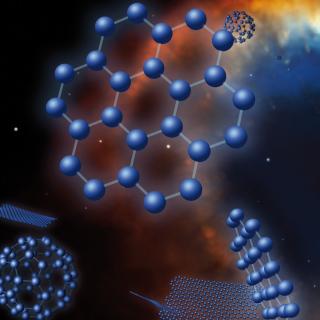Bibcode
Ginolfi, M.; Graziani, L.; Schneider, R.; Marassi, S.; Valiante, R.; Dell'Agli, F.; Ventura, P.; Hunt, L. K.
Referencia bibliográfica
Monthly Notices of the Royal Astronomical Society, Volume 473, Issue 4, p.4538-4543
Fecha de publicación:
2
2018
Número de citas
58
Número de citas referidas
55
Descripción
Here we investigate the origin of the dust mass (Mdust)
observed in the Milky Way (MW) and of dust scaling relations found in a
sample of local galaxies from the DGS and KINGFISH surveys. To this aim,
we model dust production from Asymptotic Giant Branch (AGB) stars and
supernovae (SNe) in simulated galaxies forming along the assembly of a
MW-like halo in a well-resolved cosmic volume of 4 cMpc using the GAMESH
pipeline. We explore the impact of different sets of metallicity and
mass-dependent AGB and SN dust yields on the predicted Mdust.
Our results show that models accounting for grain destruction by the SN
reverse shock predict a total dust mass in the MW, that is a factor of
∼4 less than observed, and cannot reproduce the observed
galaxy-scale relations between dust and stellar masses, and dust-to-gas
ratios and metallicity, with a smaller discrepancy in galaxies with low
metallicity (12 + log(O/H) < 7.5) and low stellar masses
(Mstar < 107 M⊙). In agreement
with previous studies, we suggest that competing processes in the
interstellar medium must be at play to explain the observed trends. Our
result reinforces this conclusion by showing that it holds independently
of the adopted AGB and SN dust yields.
Proyectos relacionados

Nucleosíntesis y procesos moleculares en los últimos estados de la evolución estelar
Las estrellas de masa baja e intermedia (M < 8 masas solares, Ms) representan la mayoría de estrellas en el Cosmos y terminan sus vidas en la Rama Asintótica de las Gigantes (AGB) - justo antes de formar Nebulosas Planetarias (NPs) - cuando experimentan procesos nucleosintéticos y moleculares complejos. Las estrellas AGB son importantes
Domingo Aníbal
García Hernández